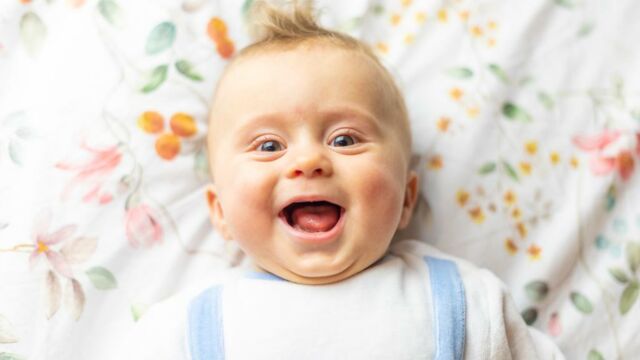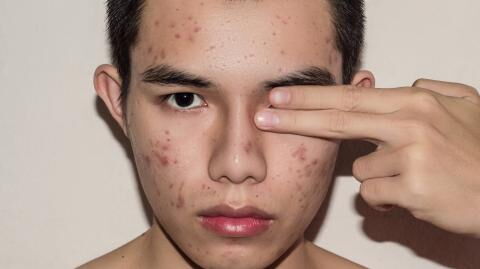Acne in babies is very common. This skin condition can cause pimples to develop on the baby’s face or body. And, although it may look painful or irritated, baby acne is harmless and often goes away with just a little patience.
Discover our latest podcast
What is baby acne?
Baby acne, otherwise known as neonatal acne, occurs in roughly 20% of babies. This skin condition presents itself as tiny red and white bumps on the baby’s skin but will most likely fade away on its own.
Baby acne most often occurs in the first few months of a baby’s life and starts about four weeks after birth, unlike infantile acne, which presents as blackheads and comedones that can persist until the age of two. Infantile acne is much less common than baby acne and can even cause cysts and nodules.
How to identify baby acne?
Just like acne in teenagers and young adults, baby acne looks like red bumps or pimples, as well as whiteheads and pustules. Often the skin will also redden around the area of the breakout. Babies can develop this type of acne anywhere on their face and body, but it is most commonly found on the cheeks, upper back and neck.
Baby acne can also become more pronounced if the baby has been crying, wearing rough fabrics or if vomit or saliva has been left on the face.
What causes baby acne?
It is still unclearwhat causes acne in babies. Some evidence has suggested that maternal or infant hormones may be involved. However, it is most commonly agreed that baby acne is caused by blocked hair follicles or by excess sebum.
How to treat baby acne?
Baby acne usually disappears without any interference. If you find your baby has some persistent spots, then a paediatrician will be able to prescribe a medicated cream or ointment.
Acne targeting skincare products such as foaming or benzoyl peroxide washes should also be avoided in cases of baby acne. A baby’s skin is very sensitive, and using strong products could provide further irritation.
Home treatments for baby acne
There are a few simple at-home tricks that can help keep baby acne at bay:
Wash the baby’s face
Keeping your baby’s face clean can go a long way in treating baby acne. All you need to do is wash the baby’s face with warm water; you can even add a gentle soap or soap-free cleanser if needed. When cleaning a baby’s face, you should ensure that any products are fragrance-free as this can irritate the skin.
Avoid harsh products
Harsh products initially designed for adult acne are often not suitable for babies. Instead, if your baby’s acne is persistent, make a visit to a paediatrician for prescription treatments.
Avoid lotions and moisturisers
Lotions, creams and moisturisers can irritate a baby’s sensitive skin and further cause acne. These products should be avoided at all times.
Avoid scrubbing
Trying to scrub or exfoliate a baby’s skin can often cause more irritation and worsen acne. Instead, gently wipe a washcloth over the baby’s face in a circular motion, then pat the face dry.
Avoid squeezing the acne
While it may be satisfying to pop acne, baby acne should be left alone. This is because babies have extremely sensitive skin, and squeezing pimples can cause irritation.















